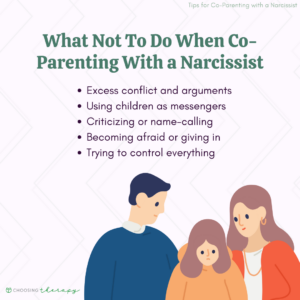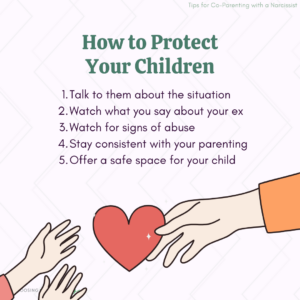Co-parenting with a narcissist can seem daunting but made possible by implementing firm boundaries, avoiding emotionally charged topics, remaining calm, and pursuing legal action when needed. Because a narcissistic co-parent will only care about their own needs, it’s important to ensure the well-being of your children first.
Would you like help recovering from a relationship with a narcissist?
BetterHelp has over 20,000 licensed therapists who provide convenient and affordable online therapy. BetterHelp starts at $65 per week. Take a Free Online Assessment and get matched with the right therapist for you.
Is Co-Parenting With a Narcissist Possible?
It can seem entirely impossible to co-parent with a narcissist–in some cases, it is. Typical co-parenting requires both adults to engage in healthy communication and exhibit mutual respect in their parenting responsibilities. While this isn’t overly difficult for most parents, narcissists are unable to consistently prioritize anyone’s needs but their own.
In circumstances where co-parenting with a narcissist is possible, and safe, doing so involves persistence and consistency in communication, expectations, and organization of responsibilities. Remember, narcissistic co-parents are toxic and will continue to emotionally abuse their ex-partners, even their children. They are unable to see beyond their own ego–this singular focus on themselves overrides their ability to focus on their children’s needs. Your ex will not be receptive to parenting suggestions or feedback from you or other concerned parties.
Co-Parenting Vs. Parallel Parenting With a Narcissist
In some cases, co-parenting just won’t work, especially in overly tumultuous relationships. In contrast, parallel parenting with a narcissist emphasizes taking more of a no-contact approach. As a result, you both continue parenting, in the ways you are used to, without checking in with one another.1
Signs You Are Co-Parenting With a Narcissist
Signs that you are co-parenting with a narcissist are usually very clear—you broke off your relationship with them for a reason. These might include trying to get the kids on “their side” or attempting to control you by using the children as pawns. You might find yourself questioning your sanity often—at the same time, you may feel outraged over their behavior. Regardless, remember that children of parents with NPD need structure, support, and validation despite their circumstances.
Signs that you are co-parenting with a narcissist may include:
- They have arrogant behaviors or attitudes
- They constantly take advantage of you, your children, and others for personal gain
- They believe they are the superior parent
- They exaggerate their personal achievements
- They are envious of your new life without them
- They believe that you are envious of them
- They have a complete lack of empathy
- They feel entitled to have more time with the children, despite custody agreements
13 Tips for Co-Parenting With a Narcissist
Co-parenting with a narcissist can seem entirely unfeasible. Dealing with a narcissistic ex when you have a child can be overwhelming, draining, and emotionally tumultuous. However, learning how to co-parent with a narcissist effectively can help keep you and your children as safe and unaffected as possible.
Below are 13 tips for co-parenting with a narcissist:
1. Accept the Situation as It Is
Sometimes, it is easier to accept the way things are with a narcissistic co-parent than to try and change them. By the time narcissists have matured into adults, they are often so set in their ways that it would take a significant effort for them to even change themselves. When you accept things as they are, you can plan for each interaction with your child’s co-parent.
2. Document Everything
In any shared parenting arrangement, it is essential that clear documentation of the expectations and responsibilities of each parent be kept. When co-parenting with a narcissistic ex, it can be even more essential to have a record of the terms that were agreed upon. Keep a daily journal in which any interactions or conversations are recorded–make sure this log is in a secure place. If pick-up and drop-off times are a concern, timestamp the events, as well.
3. Make a Parenting Plan
When co-parenting with a narcissist, be sure to create a clear and comprehensive parenting plan. This will ensure that everyone, including children, has an understanding of what is expected and when each parent will have time with the children. A parenting plan should be treated as a business agreement and seen as a contract between you and the narcissistic co-parent. If there are consequences that you both agree should be included for failure to meet the plan’s required actions, include those as well.
4. Make Everything Legal
Your narcissistic ex will likely want as much custody and rights as possible. They likely perceive themselves as a better parent, working hard to prove this greatness to others. The narcissist also may manipulate their way into various situations, such as showing up at your house spontaneously, “just to check in on the kids.” They may rile the children up for an exciting day trip even if you’ve already made plans. Having things taken care of legally limits opportunities for manipulation. There isn’t any room for “guessing.” You and your ex both know the details of your custody, and they risk serious consequences if they choose to disregard those rules.
5. Focus on Your Child’s Best Interests
When dealing with a narcissistic co-parent, always keep your child’s best interests at the top of your priority list. Narcissists brag about their parenting skills but are unable to prioritize the child they parent. It’s especially essential that you take an objective view to ensure that the choices you are making truly are in your child’s best interest. Don’t let your own negative feelings about the other parent impact your ability to do so.
Are you dating or married to a narcissist?
Whether you’re trying to move on or rebuild a relationship, a licensed therapist can guide you. BetterHelp has over 20,000 licensed therapists who provide convenient and affordable online therapy. Visit BetterHelp
Is your mother, father, or family member a narcissist?
Being raised by a narcissist can damage your confidence and self-esteem. A therapist from Online-Therapy can help you both heal from the past, and manage the relationship to be less harmful. Counseling starts at $50 per week. Try Online-Therapy
6. Set & Maintain Clear Boundaries
Narcissists often thrive on exploiting loopholes and making their own rules. They are used to going after what they want and will not stop unless they have no other choice. That’s why implementing assertive and healthy co-parenting boundaries is crucial. For example, let’s say you start dating someone new. You don’t want to talk about it with your ex. Make it known that the topic is off-limits. If they keep pressing, have an action-based consequence (walking away, asking them to leave the house, or ending the conversation altogether).
7. Limit Communication
It can be extremely freeing to step back from communication with the narcissistic co-parent. Narcissists will twist what you say, lie about why you did or did not say it, and use any conversation as a chance to get their narcissistic supply needs met. Only communicate important pieces of information, such as a child’s health concerns, changes in a child’s behavior, or relevant appointments and meetings. By keeping any communication–verbal or written/electronic–to facts and information, you are protecting yourself from potential harm.
8. Be Empathetic With Your Children
Co-parenting with a narcissist can feel all-consuming, but try to remember how your children feel. Talk to them about your divorce so that they don’t feel alienated. Be there for them during this vulnerable time. For younger kids, this means helping them identify their own feelings. If they can learn to understand these, they can use words to articulate how they feel.2 Older kids may need time and space to process their feelings. Remember that it’s normal for them to either withdraw or lash out. Try to honor their needs while letting them know they can come to you if they need anything.
W. Keith Campbell, Ph.D., Professor of Psychology at the University of Georgia states, “First and foremost, as a parent you can have a strong loving relationship with your child and serve as a positive role model. This is the most important thing you can do and also what you have the most control over. If a co-parent is abusive to a child often you are going to need to involve the courts and it can be much more difficult.”6
9. Stay Calm & Respectful
As difficult as it can seem, remaining calm and respectful in the presence of the narcissist is effective in disarming their behavior. Narcissists thrive on conflict, engagement, and high-energy interactions. By refusing to “take the bait” and keeping cool, you will be more likely able to de-escalate a situation. This can take practice, but the benefits will be worth it.
10. Maintain Perspective
When co-parenting with a narcissist, it is easy to lose perspective on the situation. By mentally “stepping outside the situation,” you can see their behaviors as a desperate effort to maintain their inflated sense of self. Keep your energy focused on parenting, not battling with your narcissistic co-parent.
11. Protect Your Children From Conflict
Children often suffer the most when their parents engage in conflict. Keep in mind that children can be highly sensitive to the tone of voice parents use, even if they are unable to make out all the words. Prioritize your children’s well-being by avoiding arguments or conflict with the narcissistic co-parent when the children are anywhere in the vicinity.
12. Prioritize Your Mental & Physical Health
Because co-parenting with a narcissist is extremely challenging, be sure to focus on maintaining your own well-being, too. When you need to engage with a narcissistic co-parent, use a third party such as your therapist or a mediator. Lean on your support system and only communicate with the narcissist when you are in a clear, level-headed state.6
13. Consider Seeking Therapy
Therapy can provide support and guidance during your co-parenting journey. Dealing with a narcissist is difficult. If you’re feeling resentful, overwhelmed, depressed, or hopeless, talking to a qualified professional can help. Seeking co-parenting counseling when co-parenting with a narcissistic ex helps you navigate the challenges. That said, this becomes trickier in cases where your ex is not devoted to change, making the couple’s work volatile and ineffective.
However, family therapy can be a beneficial option if you want to improve communication and boundaries with your children. It may also provide a protective barrier against your children developing negative behaviors.3 Regardless of your preferences, finding the right therapist can take some time. You may need to meet with a few different providers before choosing the best match for your needs. Consider starting your search with an online therapist directory.
What Not To Do When Co-Parenting With a Narcissist
Co-parenting can present tricky situations under the best circumstances, but there are several pitfalls you should avoid when co-parenting with a narcissist. Recognize that your child’s needs and best interests should always be of top importance. By keeping this in mind, you are less likely to fall victim to the traps that would bring out the worst in the narcissistic co-parent.
Below are things to avoid when co-parenting with a narcissistic ex:
Excess Conflict & Arguments
If it seems like co-parenting with a narcissistic ex is a never-ending battle, this is because doing so is. In addition, narcissists may cherish chaos, especially when it gives them attention. So, instead of giving your narcissistic ex attention, try ignoring their behavior altogether.
Using Children as Messengers
As a parent, it’s your responsibility to limit putting your children at the center of your relationship issues.4 Avoid placing pressure on your children to communicate with your ex on your behalf. Some kids will happily oblige in being a messenger, but that eagerness often comes from a place of wanting to please you. Other kids will ignore their parent’s requests, lie about the information, or resent the parent.
Criticizing or Name-Calling
Even if you know your ex does it, try your very best to avoid speaking poorly about them in front of the children. Research describes this form of bashing as ‘parental alienation,’ which can have damaging effects on young kids.5 Instead, try to remain calm when talking about the narcissistic parent. If your children mention how your ex bad-mouths you, avoid retaliation. You can dispute rumors if they aren’t true (or are otherwise inappropriate or degrading), but you should not become overly reactive or defensive.
Becoming Afraid or Giving In
When co-parenting with a narcissist, it is essential that you hold your ground, stick to your principles, and follow any arrangements set in your co-parenting agreement. Keeping steady can throw the narcissist off-balance as they use others’ distress to maintain or gain control. Don’t give them ammunition or an advantage in any situation, especially when having children with a narcissist.
Trying to Control Everything
There is no way that anyone can manage control of everything, particularly when co-parenting with a narcissist. Rather than exhaust yourself by being a micromanager, focus on the big things that are most important to your child’s welfare. Don’t make mountains out of molehills. Let little things slide, but keep a record of your co-parent’s communications and missteps. Maintain focus on the things you can control.
Challenges of Co-Parenting With a Narcissist
No matter how invested you are or strong your own parenting skills may be, it can be extremely challenging to co-parent with a narcissist. Recognizing these difficulties ahead of time can help you determine the best method of approach.
Challenges of co-parenting with a narcissist may include:
They Are Hypersensitive to Your Criticism
While a narcissistic co-parent will work hard to present a tough-as-steel persona, their big ego is as fragile as eggshells. When they receive any type of feedback that implies they have made a mistake or need guidance, this cuts them to the core. They may act out when criticized and respond by putting you down.
They Make You Look Like the ‘Bad Guy’
Narcissists are not only unable to accept constructive feedback, but they also blame others for their mistakes. If they want to do something that is detrimental to your children, they will continually try to convince you how “fun” it will be. When you still refuse their wishes, a narcissistic co-parent will communicate to the children that you’re the “bad guy” for keeping them from having fun.
They Manipulate You & Your Children
A narcissistic co-parent will employ a variety of narcissistic manipulative tactics. Narcissists may try to convince you to switch visitation times. However, they will try to convince you that this is in your own, or the children’s, best interest. If your narcissistic ex makes a decision in their own favor, they will work to persuade you that the kids would prefer things that way.
They Prioritize Their Own Needs
When co-parenting with a narcissist, remember that they will be unashamedly self-centered. They are entirely unable to see what would best serve anyone else. In turn, even the narcissist’s co-parenting responsibilities may take a back seat to their ego.
You Can Escape From A Narcissist.
Therapy can help you leave or recover from a narcissistic relationship. BetterHelp has over 20,000 licensed therapists who provide convenient and affordable online therapy. BetterHelp starts at $65 per week. Take a Free Online Assessment and get matched with the right therapist for you.
How to Protect Your Children
Your singular focus in co-parenting with a narcissist should be the well-being of your child. By putting their needs first, you are modeling skills and behaviors that will serve them well as they grow up. There are some basic ways to ensure that they are protected from any fallout or damage that comes from co-parenting with a narcissist.
Below are ways to protect your children when co-parenting with a narcissist:
- Talk to them about the situation: Children have a right to know what is going on in their families. Remember to use language that is age appropriate so they can fully understand.
- Watch what you say about your ex: Children fare better when they are not exposed to one parent’s denigration or belittling of the other parent. Children identify with their parents, so when a parent is insulted, they may feel that they are being insulted, too.
- Watch for signs of abuse: Always be alert to any signs of abuse after they spend time with the narcissistic co-parent. Also note if there are behavioral signs, such as regression or withdrawal.
- Stay consistent: Children crave routine and predictability. When they are being co-parented, it can be confusing if rules shift between homes. Help support your children by ensuring that the expectations when they are with you remain consistent.
- Offer a safe space: Make sure your home is always experienced as a safe space by your child. Children are sometimes unable to express their emotions, so by having a space where they are free to be themselves, they will benefit.
When to Consider Pursuing Full Custody
Co-parenting with a narcissist won’t work when you need to protect your children from imminent harm. If your ex is abusing, neglecting, abandoning, or acting recklessly with your children, it’s time to pursue aggressive legal help.
Full legal and physical custody means having full responsibility for your children and their decisions. Keep in mind that custody battles can become drawn-out and contentious, and every state has different laws for handling these cases. Therefore, be prepared to secure a lawyer and provide substantial evidence to the family court. A lawyer will provide you with more information about what you need to move forward, and they will work with you to prepare an optimal case.
Final Thoughts
When co-parenting with a narcissist, you can make a meaningful difference by advocating for your children’s well-being and ensuring that you aim to meet their needs. Learning how to deal with a narcissistic ex starts with awareness. Recognizing problems and addressing them early in your co-parenting experience may prevent the onward spiraling of narcissistic abuse.
Additional Resources
To help our readers take the next step in their mental health journey, Choosing Therapy has partnered with leaders in mental health and wellness. Choosing Therapy is compensated for marketing by the companies included below.
Online Therapy
BetterHelp – Get support and guidance from a licensed therapist. BetterHelp has over 20,000 therapists who provide convenient and affordable online therapy. Complete a brief questionnaire and get matched with the right therapist for you. Get Started
Online-Therapy – Online-Therapy.com provides a weekly live video session, unlimited text messaging, and self-guided activities like journaling. Starting at $64 per week, this is one of the most affordable options for CBT therapy. Try Online-Therapy
Narcissist Recovery Support Group
Circles – Anytime, anonymous, and free. Never feel alone during life’s greatest challenges. Drop-in to live conversations and share thoughts, ask questions, or learn from others on the same journey. Join Circles Now
Narcissism Newsletter
A free newsletter from Choosing Therapy for those recovering from narcissistic abuse. Get helpful tips and the latest information. Sign Up
Choosing Therapy Directory
You can search for therapists by specialty, experience, insurance, or price, and location. Find a therapist today.









